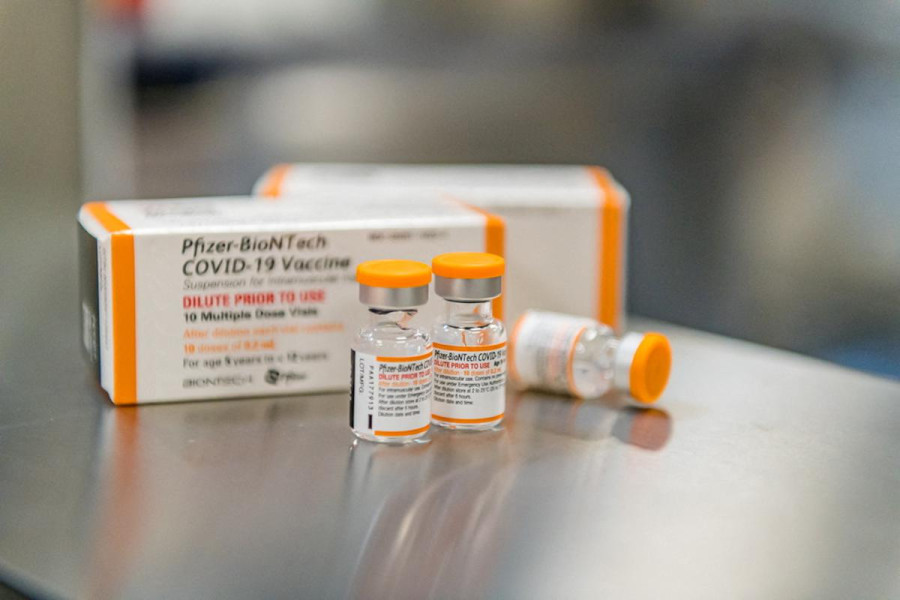Health
Nepal receives over 2.2 million paediatric doses of Covid-19 vaccine from COVAX
Vaccination campaign for children between 5 and 11 years is set to start on June 23 and will be organised in two phases.
Arjun Poudel
Nepal received 2,203,200 million Pfizer doses of Covid-19 vaccine from COVAX facility on Sunday.
The vaccine doses are part of the 8.4 million doses committed by the facility, which is the United Nations-backed international vaccine sharing scheme.
“We received the vaccine doses from the COVAX facility today,” said Dr Surendra Chaurasia, chief of the Logistic Management Section under the Department of Health Services. “We will dispatch the vaccine doses to the provinces and districts as soon as possible.”
The Health Ministry has decided to launch a vaccination programme from June 23 for children between five and 11 years old. The vaccination campaign for the children of said age group will be organised in two phases—first in 27 districts and later in the remaining 50 districts.
Children of the said age group in Jhapa, Morang, Sunsari, Saptari, Dhanusha, Parsa, Siraha, Mahottari, Kathmandu, Lalitpur, Bhaktapur, Chitwan, Kavrepalanchok, Sindhuli, and Nawalparasi West will be inoculated in the first phase.
Other districts in which vaccination drives have been planned in the first phase are
Rupandehi, Banke, Dang, Kapilvastu, Bardiya, Surkhet, Kailali, Kanchanpur and Dadeldhura, according to Health Ministry officials.
The United States government has borne the cost of the vaccine doses and the USAID facilitated the process, officials said.
The Department of Health Services has already secured emergency use authorisation for the Pfizer doses from the Department of Drug Administration, and completed training of health workers.
There are two types of Pfizer-BioNTech Covid vaccines for children—one is for those between five and 11 years, and another for those aged 12 and above. Nepal has already used Pfizer vaccines on those with comorbidities and on children between 12 and 17 years.
The Pfizer-BioNTech vaccine is the only jab recommended by the World Health Organisation for use in children between five and 11 years old.
The American Association of Paediatrics has recommended administering 10 microgram doses in a gap of 21 days to children between five and 11 years. The dose, 0.2ml, is one-third of what is administered to adolescents and adults.
The vaccine vial for 5-11 year olds comes with an orange cap while the other vial is purple-capped.
Each vial with 10 doses needs 1.3 millilitres (ml) of diluent under Pfizer’s preliminary plan.
The US Food and Drug Administration in October authorised emergency use of the Pfizer-BioNTech Covid vaccine in children between five and 11 years. Several countries have already started administering the vaccine to children.
Officials said that there will not be storage problems for the Pfizer doses, as the vaccine doses are planned to supply to the provinces and districts.
Although the Pfizer doses for adults can be kept in normal temperatures (2 to 8 degrees Celsius) for up to 31 days, paediatric doses can be stored in normal temperatures for up to 10 weeks, officials said.
The Health Ministry has planned to administer the second dose of the vaccine to children from July 18 to 25.
Earlier, the government had decided to inoculate children between five and 11 years with the Covid-19 vaccine from April. For that the Health Ministry had also decided to purchase 8.4 million doses of the vaccine and also signed an agreement for a concessional loan of $18 million with the World Bank to procure the doses.
But with the Covid-19 infection rate dropping significantly of late, the process to procure vaccine doses for the said age group was put on the back burner.
Officials said that plan to procure the vaccine doses halted after they saw a chance of getting vaccine doses free of cost.
Nepal so far has received 55,584,770 doses of Covid vaccines of various brands—AstraZeneca, Vero Cell, Moderna, Janssen, Sinovac-CoronaVac, and Pfizer-BioNTech (including paediatric doses).




 22.12°C Kathmandu
22.12°C Kathmandu















